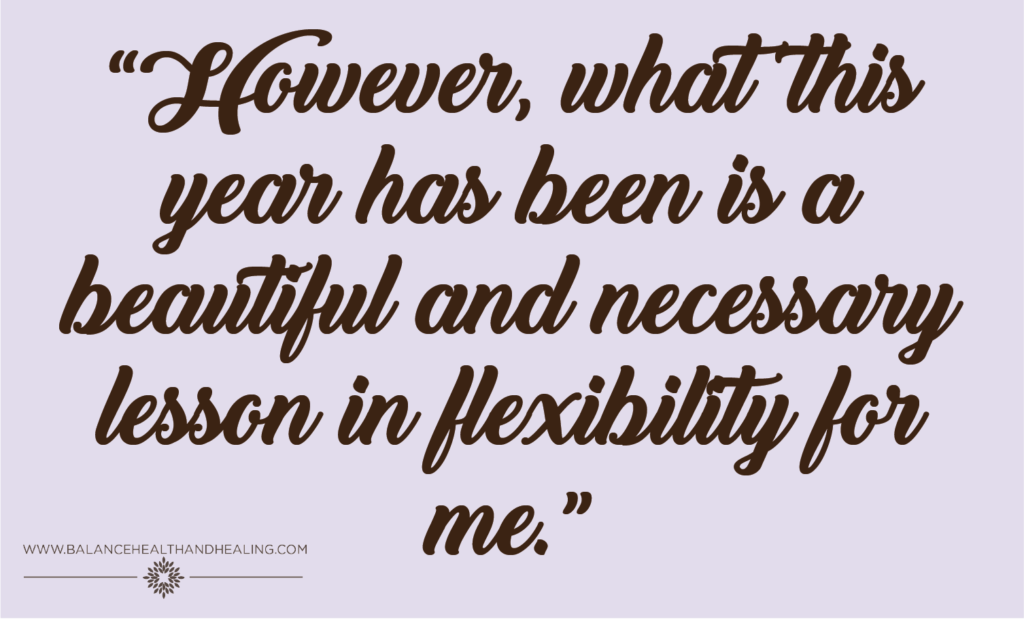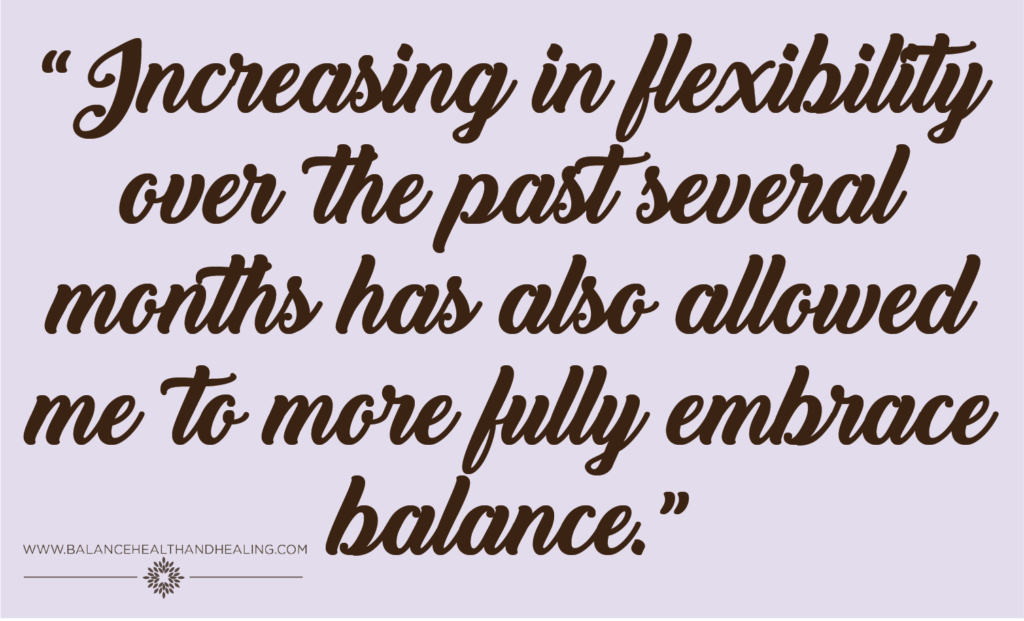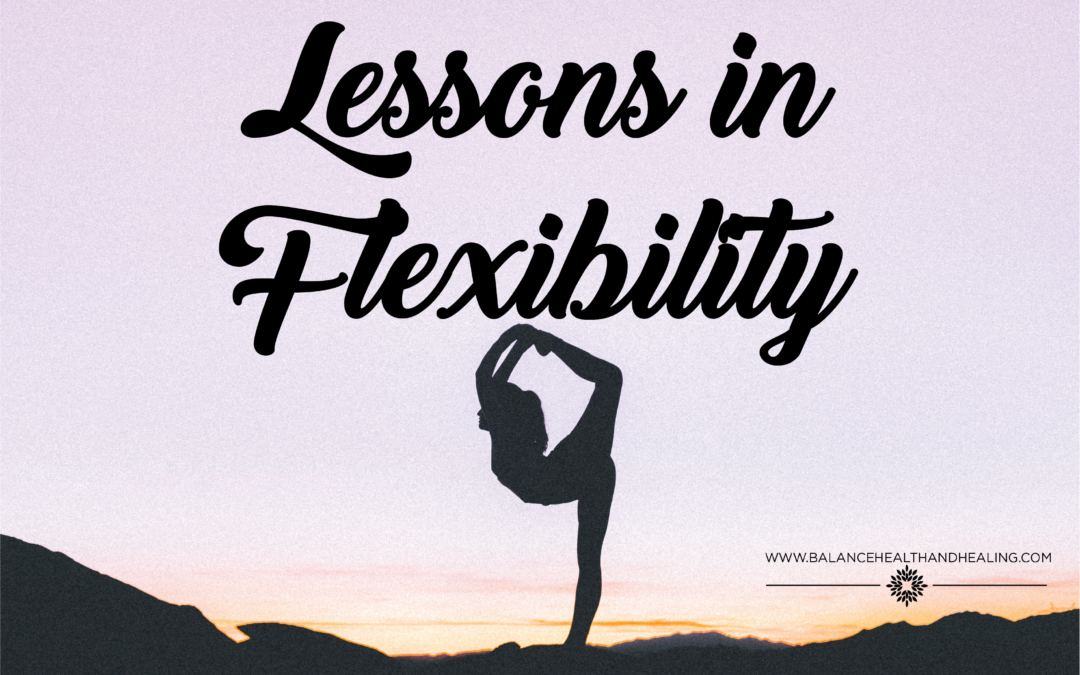I’ve never been a very flexible person. I remember in elementary school we would do the “v-sit reach” and I was always embarrassed watching my gymnast friends mindlessly fold in half while I struggled to get just one more inch (for those of you didn’t have experience with the v-sit reach and therefore don’t understand this story, consider yourselves lucky). I danced for several years growing up and would put so much effort into becoming more flexible, but alas, I never seemed to really improve. It started to feel like maybe I just wasn’t meant to be flexible and I soon accepted that this was okay.
However, being flexible has several important benefits. Flexibility helps you have fewer injuries, less pain and stiffness, greater posture and balance, and an increased sense of physical and mental relaxation. These are things I could greatly benefit from. I’ve continued to stretch, engage in yoga practice, etc. since elementary school, yet I wouldn’t consider myself to be “flexible”.
 Flash forward to 2020. I’m teaching a class in-person at BYU, seeing clients, planning a wedding, and trying to navigate family and holidays in the midst of a pandemic. Although it is a really different kind of flexibility than the v-sit reach, 2020 has taught me valuable lessons in the benefits of being mentally and emotionally flexible. I am absolutely a planner, so 2020 has thrown me for a loop in many ways. Having to juggle using Zoom for clients and teaching, not having a clear picture for what my wedding will look like, being away from family for the holidays, etc. has been challenging. However, what this year has been is a beautiful and necessary lesson in flexibility for me.
Flash forward to 2020. I’m teaching a class in-person at BYU, seeing clients, planning a wedding, and trying to navigate family and holidays in the midst of a pandemic. Although it is a really different kind of flexibility than the v-sit reach, 2020 has taught me valuable lessons in the benefits of being mentally and emotionally flexible. I am absolutely a planner, so 2020 has thrown me for a loop in many ways. Having to juggle using Zoom for clients and teaching, not having a clear picture for what my wedding will look like, being away from family for the holidays, etc. has been challenging. However, what this year has been is a beautiful and necessary lesson in flexibility for me.
A few months ago, Jen wrote a blog describing what mental flexibility is and what it looks like (link to blog post). She discusses this as a key part of resilience. I want to build on this blog and talk about why this is beneficial for us. As with physical flexibility, mental and emotional flexibility have huge benefits. I think this pandemic has taught me lessons in flexibility that I will carry with me forever as long as I keep practicing. Here are some of the ways I see flexibility as beneficial, as experienced myself!
Fewer Injuries; Less Stiffness and Pain
Although I wouldn’t consider myself to be a “rigid” person. My default is absolutely not easy-breezy. As 2020 has taught me lesson after lesson on flexibility, I have recognized that being more mentally flexible has allowed me to feel less distress when things don’t turn out the way I plan. At the beginning of the pandemic, I had a trip to Hawaii planned with friends. We soon realized that this just wouldn’t be possible as Hawaii shut its borders. I remember just crying and feeling so disappointed in my plans being cancelled. Throughout the pandemic, we all have faced disappointments both large and small. Those that are flexible can still feel disappointed but do not necessarily have to view these disappointments as “the end of the world.” The last 8 months have been so stretching that increased flexibility has been the natural outcome. The more I have learned to be flexible both emotionally and mentally, the less pain I have experienced as plans have needed to shift. I have become much less rigid in my thinking and planning as a result. Flexible mindsets really allow us to sidestep debilitating and staggering mental “injuries”.
Greater Posture and Balance
Increasing in flexibility over the past several months has also allowed me to more fully embrace balance. The pandemic has forced me to embrace more balance and less  rigidity as my routines have completely had to adjust. With the pandemic I’ve learned to prioritize more time with people around me, engaging in types of movement that bring me joy, and making stillness an essential part of my experience. When we set out with rigid expectations, even subtle shifts in our plans can cause us to stumble and throw us off balance. To use an eating recovery example, when we are rigid around food and/or exercise it oftentimes becomes difficult—seemingly impossible—to adjust our behaviors. Something like a pandemic, with gyms shutting down, working from home, grocery shopping becoming more involved, etc. can throw our entire systems out of whack if we haven’t developed the skill of mental and emotional flexibility. When we are flexible, we embrace balance, recognizing the time and season for all things in our lives.
rigidity as my routines have completely had to adjust. With the pandemic I’ve learned to prioritize more time with people around me, engaging in types of movement that bring me joy, and making stillness an essential part of my experience. When we set out with rigid expectations, even subtle shifts in our plans can cause us to stumble and throw us off balance. To use an eating recovery example, when we are rigid around food and/or exercise it oftentimes becomes difficult—seemingly impossible—to adjust our behaviors. Something like a pandemic, with gyms shutting down, working from home, grocery shopping becoming more involved, etc. can throw our entire systems out of whack if we haven’t developed the skill of mental and emotional flexibility. When we are flexible, we embrace balance, recognizing the time and season for all things in our lives.
Increased Mental and Physical Relaxation
Flexibility can lead to greater mental and physical relaxation. Yes, it’s known that twisting yourself up into a pretzel doing a consistent yoga practice is supposed to bring you inner peace, but cultivating better mental flexibility also helps bring about a sense of peace and relaxation. Mental and emotional flexibility allows you to rely upon yourself, knowing that whatever comes your way you will be able to meet head on. Although the unknown may still feel scary at time, mental and emotional flexibility allows you to be more relaxed about things not needing to go a certain way. Although building up your mental and emotional flexibility skills may seem challenging and uncomfortable at first (just as building up your physical flexibility is), the relaxation and calm that comes from knowing you are able to meet the challenges ahead of you truly brings about an deep sense of peace.
So, how are you working on your mental and emotional flexibility? Have you been exposed to lessons of flexibility whether you wanted to be or not in 2020? How has an increased sense of flexibility helped you as you’ve navigated this year?

